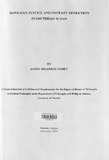Rawlsian Justice and poverty Reduction In southern Sudan

View/
Date
2009Author
Padiet, James Solomon
Type
ThesisLanguage
enMetadata
Show full item recordAbstract
This thesis deals with three independent but interconnected themes. The first theme is
John Raw!s' Philosophy of Justice. The second theme is the problem of poverty in
Southern Sudan. The third theme is the Policies and Work Plans of Government of
Southern Sudan (GoSS) - and the related projects of Non-governmental Organizations
and agencies - aiming at reducing poverty in Southern Sudan.
These themes comprise the elements of the hypothesis that: Firm philosophical
foundation of Rawlsian Justice is the missing link in the intentions of the
Government of Southern Sudan for Poverty Reduction. Thus, the objectives of the
thesis are to apply Rawlsian Justice as the philosophical framework for the policies and
action plans of the Government of Southern Sudan and to conscientise its employees on
the value of this type of justice for poverty reduction.
Rawlsian Justice basically prescribes that a fair structure of the basic instit!Jtions of
human societies should always be in place for the sake of peace, stability, development
and prosperity in the world. This should start with equal distribution of the primary goods,
especially to the least privileged members of human societies but without shifting
poverty to the privileged members. Hence, Rawls was against unjust practices like
slavery, colonialism, racism, minority oppression, gender bias, and foreign wars and
invasions, some of which were justified by some good-based philosophical tenets -
Utilitarianism, Teleological Perfectionism, Ethical Egoism and Rational Intuitionism.
Rawls critiqued these philosophies (particularly Utilitarianism) and developed his 'rightbased'
Liberal Egalitarianism as an alternative philosophy of justice, peace and
development for the contemporary world. He supported this new philosophy with some
elements of Classical Contractarianism and Deontological Constructivism, which valued
the primacy of the rational choice for equality of the dignity of every human person and decency of every human community through liberty of righteous conscience. He
summarized this philosophy into "Two Principles of Justices as Fairness" and their
corollary; the Eight Principles of ''The Law of Peoples."
Notwithstanding, Rawlsian philosophy has been critiqued by some philosophers,
academicians and professionals for different reasons. These critical debates revitalized
the fundamental questions about human societies and the search for sustainable
solutions to human predicaments within the continuous History of Political Philosophy.
And even with the critique, Rawlsian Justice has stood its ground as a relevant
philosophy for poverty reduction because of its special focus on improvement of life
quality and opportunities for the poor people without contempt to the rich ones.
Having examined Rawlsian Philosophy in details, the author of this thesis used it as a
theoretical framework for analyzing and explaining the phenomena of poverty in
Southern Sudan, especially the efforts exerted by the GoSS to reduce its prevalence.
The author applied a combination of descriptive, analytical and prescriptive methods to
test the hypothesis qualitatively. He found out from the documented policies and action
plans of the GoSS and from the views of its employees that Rawlsian Justice is the
missing or the weak link in the policies and actions against poverty in Southern Sudan.
Majority of employees in the GoSS accepted Rawlsian Justice as a solution to poverty.
In the conclusion and summary of the thesis, the author recommends the application of
Rawlsian Justice as the suitable philosophical foundation for enhancing equitable public
policies actions aimed at poverty reduction, sustainable development, durable peace
and human prosperity in Southern Sudan. He also recommends that poverty and equity
studies like Rawlsian Justice be made part of development studies in higher learning
and research institutions in Southern Sudan.
Publisher
Department of Philosophy
